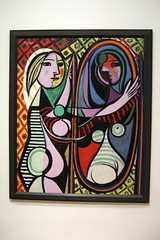 Image via Wikipedia
Image via Wikipedia
This is the sixth in a series of posts about ecumenical formation.
I have deliberately focused this blog on ecumenism within the Christian faith. There are a number of reasons for this but primarily my focus has been on Christianity and that is how I decided to organise my work.
However, this blog is also about conversation and in that sense it is fully inclusive of conversations between faiths. Christians have a unique message, which is forever getting lost amongst a lot of other material, and our role is simply to tell people what it is. It is not about conversion, although it seems to happen sometimes, or about policing people's morals. It is simply to tell the story.
I attend a small local interfaith group and this year we have been looking at the scriptures of various faiths. In May it was the turn of the Jains. So, let's start there.
Something clicked when I heard the Jain scriptures started as a library in North West India. My first thought was that I had heard this at earlier sessions about other faiths (more in later posts) and my second thought was, this library would have contained all the knowledge in the world.
That is what libraries were, collections of all the knowledge in the world. We live in a world where access to knowledge is easy. We can read. We can travel to visit libraries easily and these days access masses of information on the Internet.
What was important though was not this one library. It was all the libraries, scattered around the world, each containing all the knowledge in the world. Most of them are now lost. Interfaith conversations were not a leisure pursuit for indolent westerners, but an essential exchange of ideas.
It is this idea from the meeting about the Jains that has led to this series of posts about formation. An understanding of faith not as a series of beliefs so much as a series of libraries, each containing all the knowledge in the world.



















Recent Comments